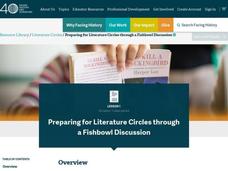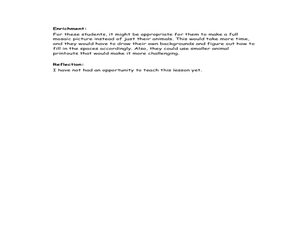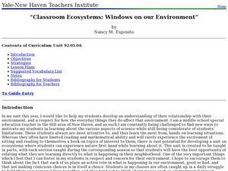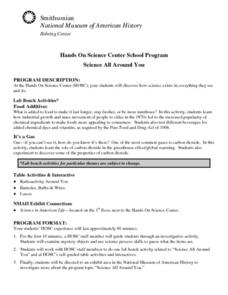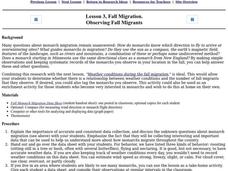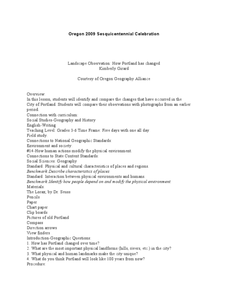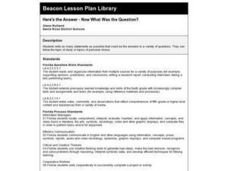Facing History and Ourselves
Literature Circles: Preparing for Literature Circles through a Fishbowl Discussion
Students examine the attributes of productive conversations. In this fishbowl discussion lesson, students observe a modeled discussion of a literature circle. Students watch a discussion of "The Bear That Wasn't" and note how individuals...
Curated OER
Art Lesson Synthesis
Students observe animals and complete an art project. In this interdisciplinary lesson, students define the word mosaic, create animal mosaics, and share their creations with the class. As students explain their art to the class they...
Curated OER
Atlas Scavenger Hunt
Students discover what type of information in an atlas by participating in a scavenger hunt. With a partner, they try to find the answers to many questions as possible. They exchange their papers with another partner group and check...
Curated OER
Chapter 3 - Worksheet 3E - Functions
In this function worksheet, students observe graphs and determine if the function of the graph is odd or even. They find the inverse of a function and determine the horizontal asymptote of a function. This four-page worksheet contains...
Curated OER
Using Chromatography to Identify Unknowns
Learners are introduced to the concept of chromatography. They practice using new vocabular and observing experiments. They answer discussion questions to end the lesson plan.
Curated OER
Introduction to Mendelian Genetics using Fiction
Learners investigate Mendelian Genetics by studying the history of Mendel and what it was like to be a 19th century scientist. They read a pieces of fiction during this investigation.
Curated OER
Sound Waves
Sixth graders discover how sound is made from vibration and moves in all directions from the source in waves. They see that sound waves can be "seen" if they are translated into light. An excellent experiment is imbedded in this lesson.
Curated OER
Classroom Ecosystems: Windows on our Environment
Students in a special education classroom examine their relationship with the environment. As a class, they examine the concept of a web of life and create their own classroom ecosystem. In groups, they record their observations and...
Curated OER
Writing About Outdoor Activities
Students discuss what they like about parks and make a list of different things they like to do there such as swing, run, play ball, ride a bike, or go on a hike. They discover the locations of some examples of National Parks and that...
Curated OER
Endosymbiosis: A Friend Within
Young scholars research the ecological principle of symbiosis. Using a microscope, students observe the relationship of mutualism between termites and flagellates. Young scholars examine a live termite and protozoans. They discuss the...
Curated OER
Remote Possibilities
Pupils collect data and analyze the data using a graph. In this statistics lesson, students use combinations and theoretical and experimental probability to analyze their data. They observe a remote controlled robot as they collect data.
Curated OER
Air Has Pressure
Seventh graders analyze evidence about particles and the exertion of air pressure. They observe an experiment with a hard boiled egg. fire and a bottle to discover the heating, cooling, and speed of air particles. They write explanations...
Curated OER
Science All Around You
Students visit and explore a Hands On Science Center (HOSC). They participate in a variety of self-guided table exercises and observe as scientists demonstrate various scientific principles.
Curated OER
Sharing Love
Pupils explore the expansion of love. They read a story about showing love and sing a song. Students draw a picture describing love. In a group activity, pupils participate in a "Greetings Dance." Students may bring pictures of...
Curated OER
Poetry
Fifth graders read several poems by famous poets and identify what about their style makes them unique. They then analyze and compare poetic style, use of forms and themes. Next, 5th graders investigate and collect different examples of...
Curated OER
Science: Identifying Properties of Matter
Young scholars observe a demonstration of the the three forms of matter - air, water, and solids - in plastic bags. After discussing the properties, they transfer them to a Venn diagram. Finally, students identify five items in the...
Curated OER
Color
Students study the elements of color in paint and light. In this color science lesson, students discuss colors in their world, white light, and rainbows. Students mix three primary paint colors to make various secondary colors. Students...
Curated OER
Do Plants Eat?
Students explain that photosynthesis is a process that plants use to convert light energy into glucose. They summarize photosynthesis as a chemical process in which the plant uses carbon dioxide and water to form glucose and oxygen.
Curated OER
What Shape Is It?
Students predict the shape of an unknown object by bouncing a ball on it. For this physics lesson, students relate this activity to how dolphins use echo-location to navigate. They analyze their lab result and discuss findings.
Curated OER
Observing Fall Migrants
Students keep a detailed data collection log of the different types of monarch behavior. They track the weather conditions daily and link it to the migration of the monarchs. They summarize their data using either a graph or a computer...
Curated OER
Artifacts: What Am I?
Pupils practice simple Japanese expressions. They explore the information available from artifacts. Groups of students attempt to figure out other groups culture by examining a series of artifacts in a paper bag.
Curated OER
Landscape Observation: How Portland Has Changed
Students read The Lorax and discuss how populations change the environment. Using given photos, students use a Venn Diagram to compare and contrast the Portland of yesterday to present day Portland. They write a comparison paper and...
Curated OER
The Heat is On
Third graders experiment with heat through investigations. They rub objects together and compare the relative differences in the amount of heat given off. They write in their journals about the results they find.
Curated OER
Here's the Answer - Now What Was the Question?
Fifth graders write as many statements as possible that could be the answers to a variety of questions. They can follow the topic of study or topics of personal choice.


